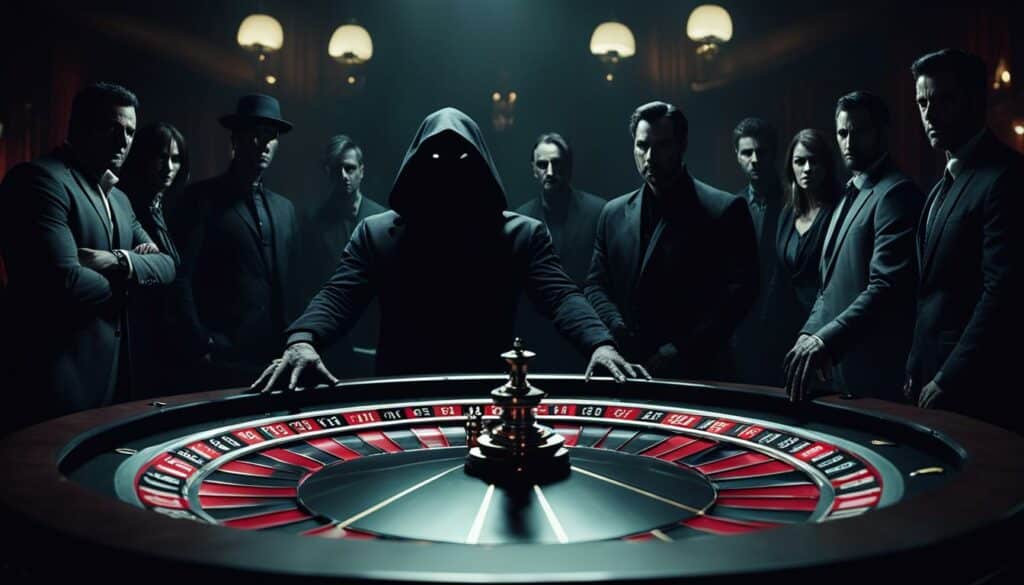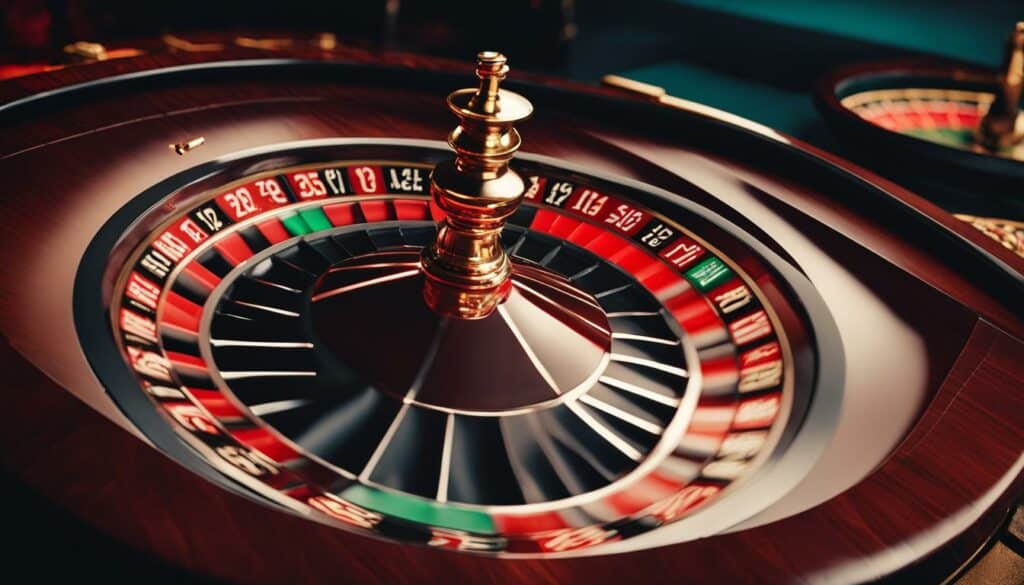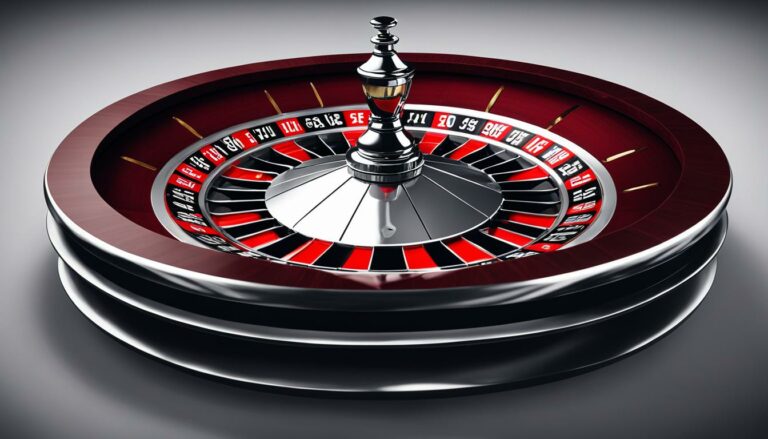Roulette, one of the most popular casino games of all time, has earned the nickname “the devil’s game.” But why is that? To understand the origins of this infamous moniker, we must first explore the history of the game itself. Roulette has a rich and fascinating history, originating in 17th century France before spreading to the rest of Europe and eventually to the United States.
As we delve deeper into the complex origins of this game, we’ll also uncover the strange superstitions and folklore surrounding it. We’ll examine the mysterious connection between roulette and the supernatural, and the symbolic elements of the game that may have contributed to its devilish reputation.
Join us as we explore the fascinating history and enigmatic reputation of roulette, and discover why it has earned the nickname of “the devil’s game.”
The Origins of Roulette
The history of roulette dates back to 17th century France when Blaise Pascal, a scientist and mathematician, attempted to create a perpetual motion machine. Instead, he invented the first roulette wheel, which he used to demonstrate mathematical theories of probability. In 1796, the game was introduced in Paris casinos and quickly became popular.
The word “roulette” comes from the French word meaning “little wheel.” The game itself is a combination of several popular gambling games of the time, including the Italian game of Biribi and the English game of Roly-Poly.
At first, roulette had both a single zero and a double zero pocket, as well as an American Eagle pocket. However, the eagle pocket was eventually removed, and the game became known as European roulette. Meanwhile, the game continued to evolve, with variations such as American roulette and mini roulette being introduced in different parts of the world.
Today, roulette is one of the most popular games in casinos worldwide, with players drawn to its exciting gameplay and potential for big wins. Its origins may be rooted in 17th century France, but its enduring popularity ensures that it remains a fixture of the gambling world today.
The Devil’s Wheel: Roulette’s Mysterious Connection to the Supernatural
There is no denying that roulette has earned the nickname “devil’s game” for a reason. The game has a long-standing association with the supernatural, from superstitions about lucky numbers to beliefs that playing roulette is a pact with the devil himself.
One of the most fascinating aspects of roulette’s connection to the supernatural is the symbolic elements of the roulette wheel itself. The colors of the wheel – black and red – have been associated with concepts like good and evil and heaven and hell. Additionally, the sum of all the numbers on the wheel is666 – a number that has long been associated with the devil.
“Some say that the roulette wheel is a gateway to the supernatural realm, where luck, fate, and the devil himself reside.”
It’s not just the wheel that has a connection to the supernatural. There are also numerous roulette superstitions and folklore that have been passed down through generations. Some players believe that blowing on the ball before it lands on a number will bring them good luck, while others avoid playing on particular days of the year or during certain lunar cycles.
In conclusion, the mysterious connection between roulette and the supernatural is an intriguing aspect of the game’s history and folklore. Despite its reputation as the devil’s game, roulette continues to draw players from around the world, who hope to strike it lucky while playing on the enigmatic roulette wheel.

Roulette in Gambling Lore
Throughout history, roulette has been associated with luck and chance. It’s no surprise that this popular casino game has been featured in literature, movies, and popular culture as it has become an iconic symbol of gambling. The nickname, “devil’s game,” only adds to its enigmatic allure, solidifying its reputation as a classic game of chance.
The portrayal of roulette in gambling lore is largely dependent on its unique characteristics as a casino game. The thrill of the spinning wheel and the anticipation of where the ball will land has captivated audiences for centuries, further adding to its popularity and mystique.
One notable example of roulette in popular culture is in the classic Bond film, Casino Royale. In the iconic scene, James Bond plays a high-stakes game of roulette against the film’s villain. This scene showcases the suspense and thrill that is often associated with roulette and gambling in general.
| Movie title | Year released | Roulette scene description |
|---|---|---|
| Casino Royale | 2006 | James Bond plays a high-stakes game of roulette against the film’s villain. |
| 21 | 2008 | The main character uses a technique known as card counting to win big at the roulette table. |
| The Sting | 1973 | Two con men play a rigged game of roulette to win big against a mob boss. |
Even outside of the world of film, roulette has become synonymous with the exciting world of gambling. From Las Vegas to Monte Carlo, the roulette table is a staple at many casinos worldwide. Its nickname, “devil’s game,” adds to its allure, drawing in gamblers seeking a thrilling game of chance.
Stay tuned for the conclusion, where we will summarize the key points about roulette and its intriguing nickname: the devil’s game.

Conclusion
In conclusion, roulette has a long and fascinating history, originating in 17th century France as a popular casino game. However, despite its widespread popularity and reputation as a game of chance, roulette has also garnered a somewhat sinister reputation as the devil’s game.
Throughout this article, we have explored the reasons behind this nickname, including the superstitions and folklore surrounding the game, as well as its symbolic connection to the supernatural. We have also examined the role of roulette in gambling lore, where it has been portrayed as a game of luck and chance, further cementing its reputation as a dangerous and seductive pastime.
While the origins of roulette may be shrouded in mystery, its place in popular culture as the devil’s game is undeniable. Whether you believe in its supernatural connections or not, roulette remains a thrilling and captivating game, loved by millions around the world.
FAQ
Why is roulette known as the devil’s game?
Roulette is often referred to as the devil’s game due to its association with gambling and the element of chance. The nickname stems from the belief that playing roulette is a pact with the devil, as players tempt fate and risk losing their money.
What is the history of roulette?
Roulette originated in 17th century France and quickly gained popularity as a casino game. It was initially introduced by Blaise Pascal, a renowned mathematician, as a perpetual motion machine. Over time, the game evolved to include the iconic roulette wheel and betting system, becoming the game we know today.
What are the superstitions and folklore surrounding roulette?
Roulette has a rich history of superstitions and folklore. Many believe that certain numbers or colors are luckier than others, leading players to place their bets accordingly. Additionally, some individuals view the spinning roulette wheel as a mystical symbol, attributing supernatural powers to the game.
How does roulette fit into gambling lore?
Roulette occupies a prominent place in gambling lore, symbolizing luck and chance. Its association with the devil’s game and the allure of the casino make it a popular subject in literature, movies, and popular culture. Roulette’s reputation as a game of risk and excitement has solidified its position as one of the most iconic casino games.


